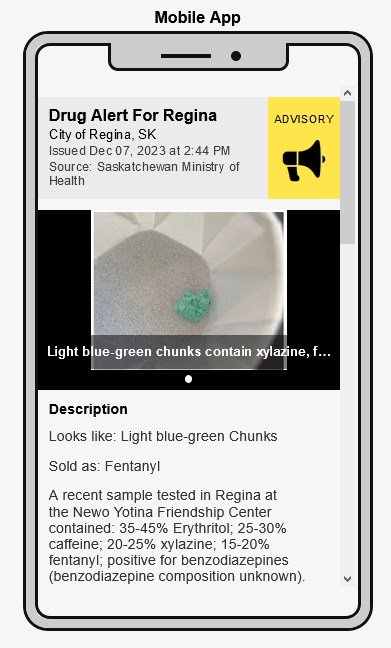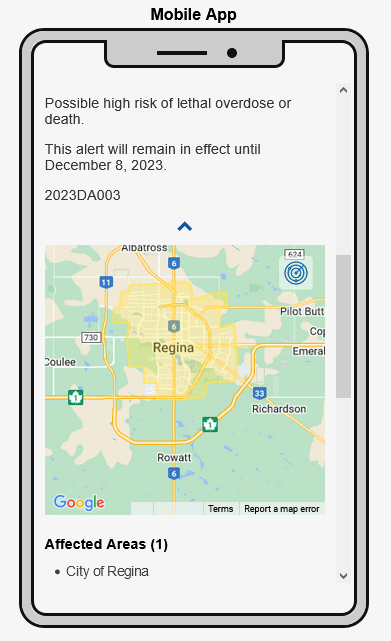Released on January 11, 2024
Today, Minister of Mental Health and Addictions Tim McLeod joined City of Regina Mayor Sandra Masters, representatives of the Regina and Saskatoon Fire and Police Services, and the Saskatchewan Coroners Service to mark the launch of a new Provincial Drug Alert System.
The new Provincial Drug Alert System will enable the Ministry of Health to better coordinate the issuance of drug alerts and assist partner organizations with monitoring the toxicity of illicit drugs across Saskatchewan.
With the new system, drug alerts will meet at-risk people where they are at via text, email, and through the Alertable app, in addition to alerts that are currently posted by partner organizations at locations where services are provided. Anyone can sign up to receive a drug alert via text, email or through a downloadable app.

“The goal of drug alerts is to increase awareness of the dangers of illicit drugs and the presence of other toxic substances that further increase the risk of overdose and death,” McLeod said. “An important part of our message to people who have yet to walk the path to recovery is that there is hope for recovery, and there is help available through treatment.”
Drug alerts will be issued by the Ministry of Health based on information provided from partner organizations such as the Saskatchewan Coroners Service, Regina and Saskatoon Fire Services, and drug checking sites in Saskatoon and Regina.
Alerts are issued when partners report to the Ministry of Health the following situations:
- more than expected number of individuals seen by paramedic, or in hospital, with an overdose over a short period of time;
- multiple severe outcomes (ICU admissions, deaths) over a short period of time;
- multiple overdoses in persons who use or live in the same area or location or who report use of a common substance;
- overdoses that are difficult to reverse with naloxone; and
- concerning substances in circulation that have the potential to cause harm or death.
Signup information is available at saskatchewan.ca/drug-alerts or text JOIN to 1-833-35-B-SAFE (352-7233).

The new Drug Alert System is an initiative under the Saskatchewan Drug Task Force (SDTF), a multi-agency collaboration that includes representatives of the Regina and Saskatoon Police Services, the RCMP, the Saskatchewan Health Authority (SHA), the Ministries of Health, Social Services, and Corrections, Policing, and Public Safety, and Saskatoon Tribal Council Chief Mark Arcand.
Other initiatives through the SDTF include the Overdose Outreach Teams (OOT) pilot project, which pairs first responders with health care professionals to conduct outreach to people who are at risk of overdose. The OOT pilot project is a collaborative initiative between the SHA and Regina Fire and Protective Services and the Saskatoon Fire Department.
The Government of Saskatchewan has committed to doubling the number of addictions treatment spaces across the province by adding at least 500 more spaces under the new Action Plan for Mental Health and Addictions. A total of 168 spaces have been announced so far, including 26 post-treatment spaces at St. Joseph's Addiction Recovery Centre in Estevan, 32 intensive outpatient treatment spaces through Possibilities Recovery Centre in Saskatoon, 14 inpatient treatment spaces at the former Drumming Hill Youth Centre facility in North Battleford, 36 virtual treatment spaces through EHN Canada, and 60 inpatient treatment spaces through EHN Canada near Lumsden, close to Regina.
-30-
For more information, contact:
Media
Health
Regina
Phone: 306-787-4083
Email: media@health.gov.sk.ca


